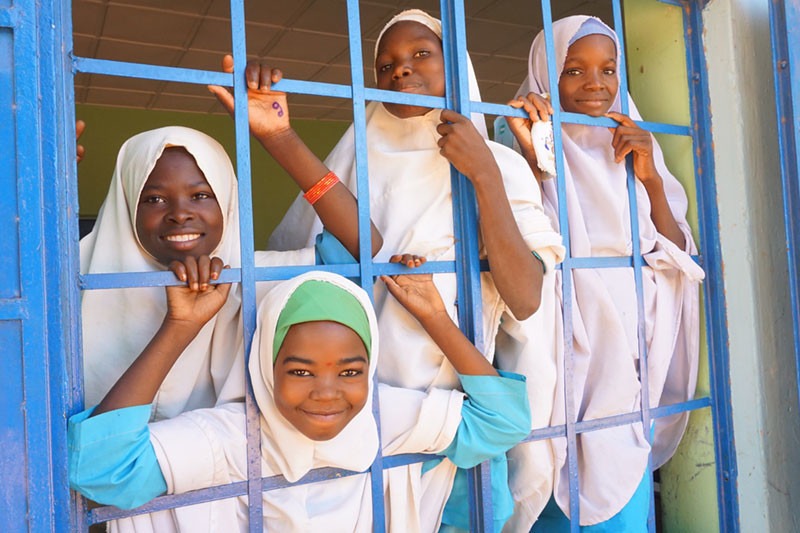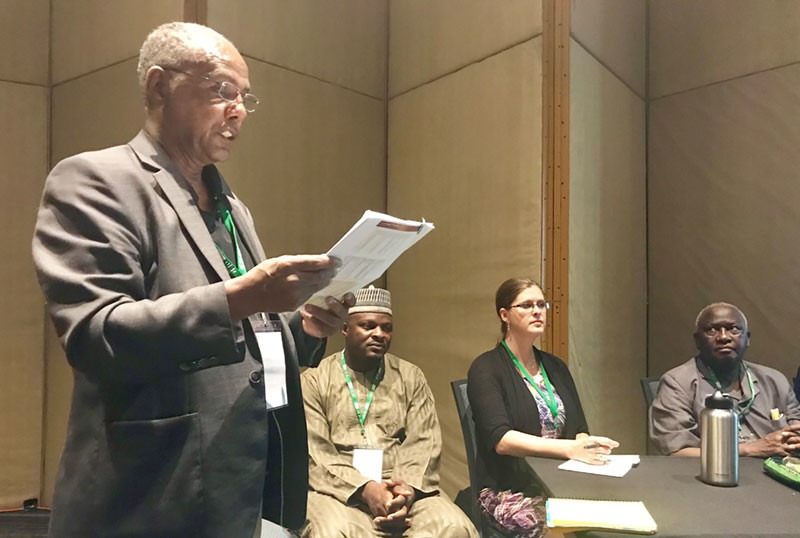MEXICO CITY — More than 30 percent of school-aged children in northern Nigeria do not have access to basic education. Falta de motivación de los docentes y apoyo de los padres., Sumado a la insuficiencia de materiales de aprendizaje y enseñanza, han contribuido a esta brecha educativa..
An integrated approach is needed to achieve optimal reading outcomes and strengthen education systems in complex environments like Nigeria, dijo un panel de expertos en el Sociedad de Educación Comparada e Internacional (CIES) conferencia en marzo 27.
“The lack of formal reading national policies in Nigeria has resulted in teachers who are unprepared to teach primary school curriculum and students who are unable to gain literacy skills,” said Creative Associates International’s Semere Salomón, Senior Director of Africa Strategy.
For Solomon, who manages an education project in Nigeria called the Iniciativa de Educación del Norte Plus, this is where a “whole child, maestro completo, whole school and whole system” approach can make a difference.

In the panel session called “Pre-Service, In-Service and Policy Reform: A Three-Legged Stool for Improved and Sustained Early Grade Reading Outcomes,” Solomon said the Northern Education Initiative Plus project is witnessing positive change through a “packaged approach to increasing access and the quality of education.”
Effective community mobilization, literacy policy reform, multilevel government collaboration, improved learning and teaching materials and mentoring and coaching of teachers are all key ingredients in applying a sustainable, enfoque holístico, said Solomon, who served as the panel’s discussant.
Financiado por elA NOSOTROS. Agencia para el Desarrollo Internacional, elIniciativa de Educación del Norte Plus is being implemented in formal and non-formal schools in Nigeria’s Sokoto and Bauchi states with the goal of improving reading skills for more than 2 millones de alumnos de primaria.
Creative implements the program in close partnership with Centro de desarrollo educativo, Universidad Estatal de Florida y Consultoría Estratégica en el Extranjero.
Now in the second of its five years, Northern Education Initiative Plus has developed a comprehensive program called leamos! (leamos!) for helping students learn to read in Hausa, su lengua materna, y luego hacer la transición al inglés. The project has distributed more than 1.9 million reading materials to students and teachers. In all activities, government partners take the lead.
“Leadership of the project is in the hands of the federal, state and local officials,” said Solomon. “With constant collaboration and ongoing consultation, the Nigerian government is facilitating the process of strengthening the overall education system.”
The early grade reading project is creating a forum where all education counterparts can come together to address local problems using evidence-based research, añadió.

Fostering better learning outcomes with policy
Representing the Northern Education Initiative Plus project with Semere Solomon, Bilyaminu Bello Inuwa, Hausa Reading and Standards Specialist, outlined the project’s reading policy development process.
“From the project’s Early Grade Reading Assessment, we found that more than 90 percent of children in Nigeria could not read a single word,” said Inuwa. “We pointed to that evidence when collaborating with the Nigerian government to design early grade reading policies.”
Leadership of the project is in the hands of the federal, state and local officials. With constant collaboration and ongoing consultation, the Nigerian government is facilitating the process of strengthening the overall education system.
Semere Salomón, Senior Director of Africa Strategy at Creative
To improve early grade reading outcomes, the project has facilitated a participatory process with policymakers to implement a policy mapping exercise, create three policy briefs and develop a road map for designing a National Reading Framework.
El three policy briefs –focused on the global best practices of reading programs often referred to as the “5 Ts” (Enseñanza, Tiempo, Lengua, Texto y pruebas) – provide recommendations for improving lectura de primeros grados.
The close collaboration with the government on policy reform has proved to be effective.
“We have seen some key education shifts in Bauchi and Sokoto states,” said Inuwa. “After ongoing dialogue and presenting evidence, the Nigerian government agreed to amend the first to third grade school timetable from five to ten periods per week to language – both in Hausa and English."
The former reading policy mandated only 30 minutes each week of language instruction and “that little amount of time is not going to take your kids anywhere,” said Inuwa.
For students to learn how to read, teachers must be proactive and provide adequate time for them to master the English language and their mother tongue language, añadió.
He also emphasized that sustainable change to improve literacy education requires systemic action.
“Reading policies have to be in place in order to get consistent, sustained improvements in the delivery of an integrated early reading program, and improve the Nigerian educational system as whole," dijo.
Asistencia al CIES?
Para visitar el CIES de Creative 2018 Centro de informes especiales, haga clic aquí. Para consultar la programación completa del CIES de Creative 2018 paneles, incluyendo panelistas, horarios y lugares, haga clic aquí. Además de las sesiones de panel, pasar por el stand 54 interactuar con expertos en educación y aprender más sobre los proyectos globales de Creative. Síguenos en Twitter @1977Creativo para actualizaciones en vivo.